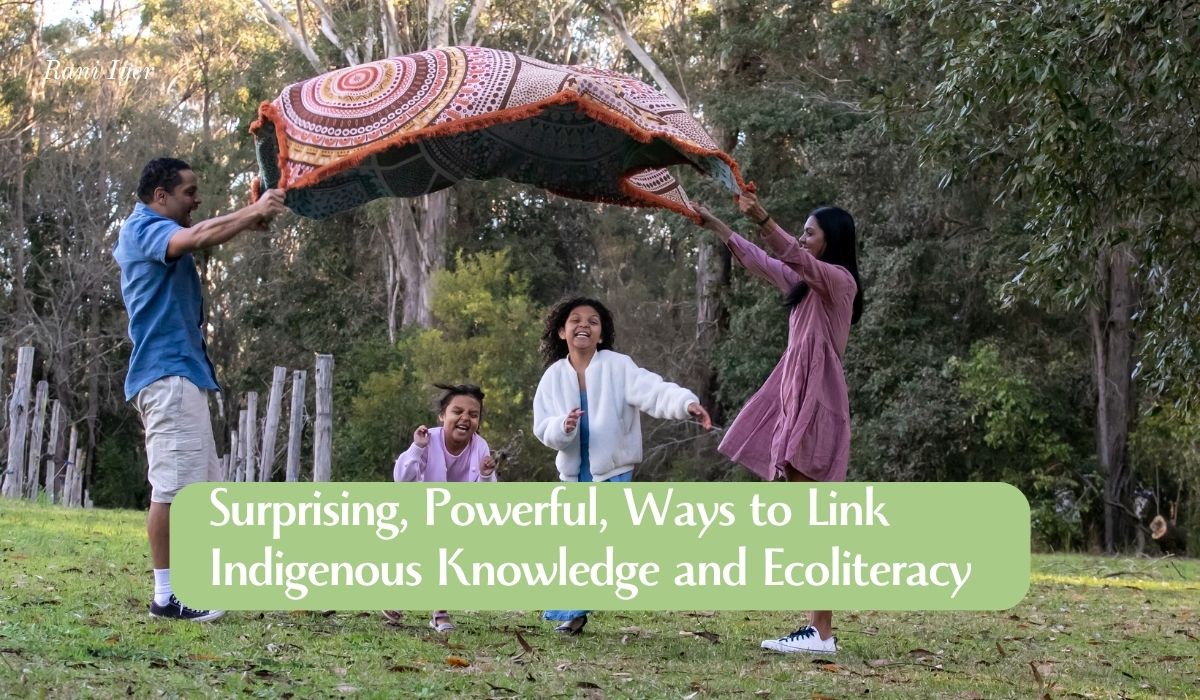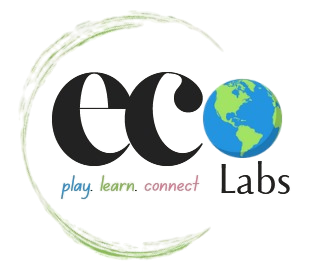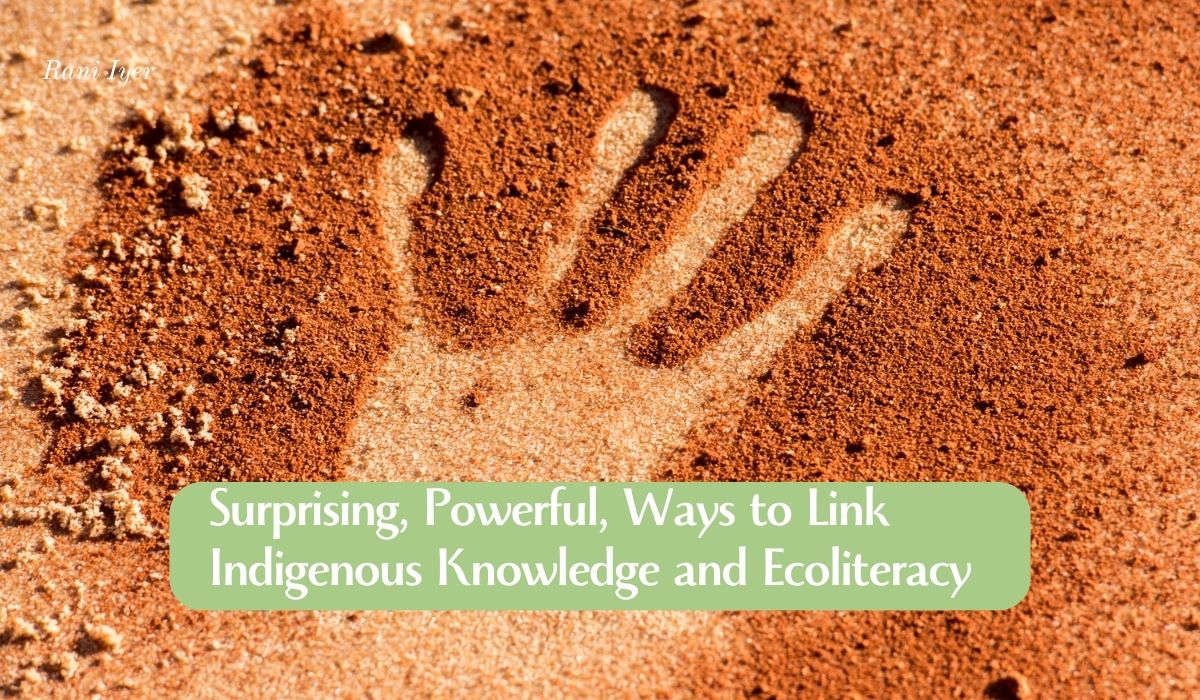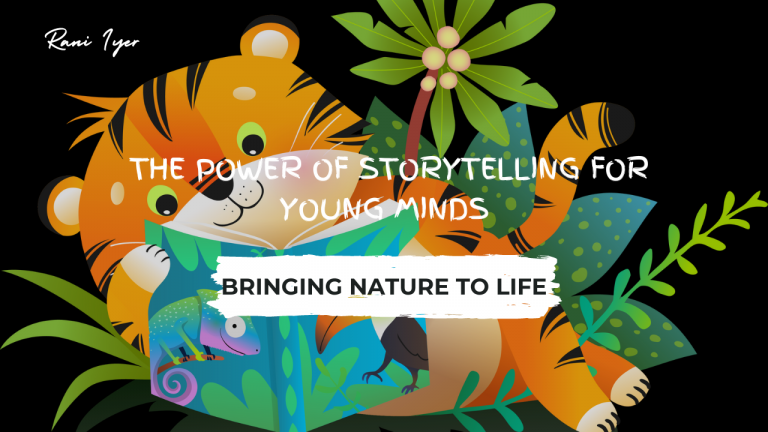Children who grow up playing in forests, along rivers, and on village commons don’t just collect memories — they acquire living knowledge about how ecosystems work, how seasons cycle, and how people belong to place. That “living knowledge” — often called Traditional Ecological Knowledge (TEK) or Indigenous land-based knowledge — is a vibrant foundation for ecoliteracy: the capacity to understand, care for, and act in the world as a member of ecological communities. In this post I unpack why land-based learning matters, summarize the evidence for its benefits, describe traditional games that teach ecological sense, and show how Rani Iyer’s Ecolabs translates both traditional sciences and modern science into authentic, play-based resources that connect children and families with nature.
Why land-based knowledge is central to ecoliteracy
Indigenous land-based knowledge is not simply a collection of facts about plants or animals. It’s a relational system — stories, practices, rituals, place names, seasonal calendars, taboos, and games — that encodes how people observe, test, and transmit ecological information across generations. Scholars define this body of knowledge as Traditional Ecological Knowledge (TEK) and emphasize its adaptive, cumulative nature. TEK has helped communities manage resources sustainably for centuries and lends powerful pedagogy for teaching young people how to notice patterns in nature and make stewardship decisions. ResearchGateESA Journals
Practical takeaway for educators and families: when learning invites children to attend to place — to track a bird’s return each spring, measure soil moisture across a season, or compare how different routes flood — knowledge becomes grounded and memorable. That’s ecoliteracy.
What the research says: nature experiences boost learning, health, and stewardship
There’s a growing, converging body of evidence showing direct benefits of nature-based learning:
- Cognitive and academic gains: Reviews of hundreds of studies indicate that time in nature supports academic learning (especially science), attention, and working memory in children. Experiential, outdoor activities often increase motivation and deepen conceptual understanding. PMCResearchGate
- Mental and physical health: Pediatric and child-development authorities link outdoor play to improved physical activity levels, lower stress, and better social skills. The American Academy of Pediatrics and allied organizations recommend unstructured outdoor play as essential for healthy development. AAP PublicationsNAEYC
- Environmental stewardship: Land-based learning that incorporates Indigenous perspectives fosters stronger place attachments and pro-environmental behaviors in youth — learning stewardship through participation, ritual, and play. Recent program evaluations of land-based curricula highlight gains in ecological knowledge and stewardship values. Canadian Commission for UNESCOSpringerLink
Practical takeaway: combining pedagogies from TEK (story, practice, seasonal cycles) with modern outdoor pedagogy produces measurable learning and wellbeing outcomes.
Traditional games in nature: play as pedagogy
Across cultures, traditional games are portable, low-tech vehicles for ecological learning. They teach motor skills, observation, timing, collective memory, and the ethics of sharing the land. Here are examples (with safe, age-appropriate ways to try them):
- One-Foot High Kick (Inuit) — a coordination and timing game that teaches balance, community celebration of physical skill, and respect for animal harvests (often performed as tests of agility tied to hunting cultures). A simple backyard variant encourages focus and gentle competition. Active For Life
- Snow Snake / Stick-slide games (Haudenosaunee & North American Indigenous groups) — use natural implements and landscape features (snow tracks, cleared grooves) to teach craft, judgment of weather/conditions, and iterative experimentation with simple technologies. Adaptation for non-snow environments: make small stick-tracks using sand or leaf litter. Queensland Government, intranet.csf.bc.ca
- Make-the-stick-jump (Blackfoot) and other target games — sharpen spatial reasoning and fine motor skills while using found materials (stones, sticks, seeds). These games teach resourcefulness and reverence for natural materials. Active For Life
Community resources (collections of Indigenous games curated for leaders) show that many activities explicitly connect children with land-literacy: recognizing local plants used in equipment, understanding seasonal constraints, and honoring protocols for shared places. intranet.csf.bc.ca
Practical takeaway: incorporate one or two traditional games into each outdoor session. Begin with a land-story or short protocol (why this game matters) to root play in cultural and ecological context.

Designing Ecolabs: bridging traditional sciences and modern learning (Dr. Rani Iyer’s model)
Dr. Rani Iyer and her Ecolabs project (Eco Explorers) model a fusion of scholarly ecology, language-based pedagogy, and traditional knowledge to create nature games and kits for families and schools. Rani brings academic credentials in ecology and education and rooted experience with storytelling and place-based learning — an ideal profile for producing authentic resources that honor both tradition and science.
How Ecolabs can (and already does) translate land-based knowledge into learning products:
- Place-anchored play kits: small, portable kits that include prompts to notice seasonal signs (bud stages, bird calls) plus a simple traditional game that focuses attention on a local phenomenon.
- Story + STEAM bundles: short oral histories or Indigenous origin stories paired with simple experiments (water table soil tests, leaf pigment experiments) to connect narrative and inquiry.
- Family stewardship challenges: multi-week activities that invite family teams to map a neighborhood microhabitat, log changes, and propose a small stewardship project (plant native species, clean a creek).
- Teacher guides with ethically sourced TEK: classroom resources that include consultative notes from Indigenous knowledge holders, permission protocols, and culturally safe ways to teach traditional games. (Ethics and community partnership are non-negotiable.) fnwsceducation.files.wordpress.comResearchGate
Practical takeaway: when building ecolabs or curriculum, center community voice and avoid extracting knowledge. Co-design with local knowledge keepers and make reciprocity explicit.
Sample 4-week mini unit: “Play, Notice, Steward” (A template for families & Ecolabs)
Week 1 — Sense of Place: Go for a 30-minute nature walk. Play a traditional observation game (e.g., “Who Sees First?”). Journal one plant or animal.
Week 2 — Experiment: Collect fallen leaves (one per child). Do a simple leaf-pigment rubbing and hypothesize why leaves differ across microhabitats.
Week 3 — Play & Practice: Teach a traditional stick game; discuss where materials came from and the ethics of taking them.
Week 4 — Stewardship Project: Small action — plant a native seed, build a bug hotel, or pick up litter. Share learning in a family circle with a story or poem.
Practical tips for educators & families
- Prioritize unstructured time in nature; research shows free play produces unique cognitive and social benefits. AAP PublicationsNAEYC
- Start local: use your nearest green patch — a street verge, a schoolyard tree, a rooftop planter — and build curiosity there.
- Co-create rules: before playing traditional games, set agreements about respecting plants, not disturbing nests, and leaving no trace.
- Honor provenance: when borrowing a game or story from an Indigenous tradition, credit the community and, when possible, partner or seek guidance. intranet.csf.bc.cafnwsceducation.files.wordpress.com
Dr. Rani Iyer & Ecolabs: where tradition meets design
Dr. Rani Iyer positions herself as a practitioner and scholar bridging traditional sciences and modern ecological education. Her Ecolabs/Eco Explorers work translates place-based practices into playkits, curricula, and family activities designed to build ecoliteracy, curiosity, and stewardship among children and families. For educators seeking resources that are research-informed and culturally respectful, this blended approach offers a model for authentic connection to land and learning.
References & further reading (selected studies & resources)
- Indigenous land-based education overview — UNESCO (Land as teacher: understanding Indigenous land-based education). Canadian Commission for UNESCO
- Berkes, F. & literature on Traditional Ecological Knowledge (TEK). (Summaries & reviews). ResearchGateESA Journals
- Kuo, M., & others — Do experiences with nature promote learning? (Integrative review, PMC). PMC
- American Academy of Pediatrics — The Power of Play (policy / developmental recommendations). AAP Publications
- Indigenous Games for Children (resource compendium / activity cards). intranet.csf.bc.ca
- Nature-based learning outcomes & school garden research (impact synthesis). ResearchGateBritish Ecological Society Journals
- Recent scholarship: land-based learning & sustainability education (case studies with Woodland Cree). SpringerLink


